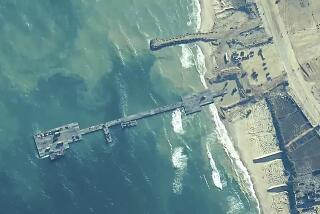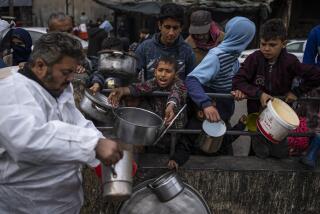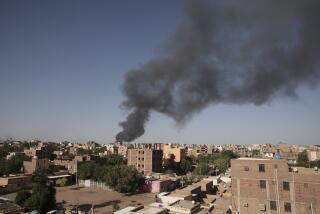U.S. Begins Food Airdrops to Besieged Bosnian City
- Share via
WASHINGTON — The United States began airdropping food and humanitarian relief supplies over the besieged Muslim enclave in Mostar on Tuesday after an aid convoy failed to reach the southern Bosnian city by land, U.S. and U.N. officials said.
The first flights over the area began late Tuesday, according to U.N. officials. The Pentagon said the U.S. European Command at Rhein-Main Air Base in Germany, which staged the air operation, reported that two Air Force C-130 cargo planes dropped about 13,000 prepackaged rations over the area.
As many as 55,000 Muslims there have been cut off from aid supplies by Bosnian Croats, and officials have feared that there may be widespread starvation unless the relief packets are delivered soon.
There were indications, however, that the overland aid would soon be allowed to reach the city.
The failure of the overland convoy to reach the city Tuesday underscored the precarious situation in Bosnia despite weeks of peace negotiations in Geneva among the three warring factions.
A few hours before the airdrops were to begin Tuesday, opposing Muslim and Croatian commanders whose forces have been fighting in the area agreed to exchange the bodies of fallen soldiers, presumably paving the way for the truck convoy to enter the city.
The Croats had blocked the convoy from reaching Mostar after charging that the Muslims were refusing to turn over the bodies of nine Croatian soldiers killed during an earlier exchange of gunfire.
Croatian negotiators had rejected a proposal to give Mostar the status of an international protectorate, which would have allowed U.N. forces to enter the city.
The airdrops were requested by the U.N. high commissioner for refugees in Geneva.
Sylvana Foa, a U.N. spokeswoman, told Reuters news agency that the Muslims have only enough food for three to 10 days.
If the food convoy is permitted to enter Mostar today, it will be the first to reach the Muslim sector of the city since June 15. The line of U.N. supply vehicles is said to be carrying about 200 tons of food and medical supplies.
The United States has been airdropping food and medical supplies to areas of Bosnia-Herzegovina since late February.
In Brussels on Tuesday, NATO officials warned that the organization’s threat to launch air strikes against forces that persist in blocking aid supplies in Bosnia could apply to the Croats besieging Mostar as well as to Serbs surrounding Sarajevo.
Meanwhile, in an almost surreal atmosphere at the United Nations in New York, the Security Council unanimously passed a resolution reaffirming its opposition to territorial aggression in Bosnia-Herzegovina and yet praised the Geneva mediators whose peace proposals would allow the Bosnian Serbs to keep most of what they have conquered.
In an emotional speech, made in English instead of his native Spanish, Venezuelan Ambassador Diego Arria said that, while Bosnia “would pay an extremely high price” if it accepted the proposals, “the international community will definitively pay an even higher one in moral and political terms. . . . The aggressor’s triumph will surely diminish all of us in the Security Council.
“I trust that tomorrow when contemplating the devastation of the remains of what used to be a beautiful country,” he went on, “. . . we will not have to be reminded of Shakespeare’s lament in ‘Henry V’: ‘Shame and eternal shame, nothing but shame.’ ”
More to Read
Sign up for Essential California
The most important California stories and recommendations in your inbox every morning.
You may occasionally receive promotional content from the Los Angeles Times.













